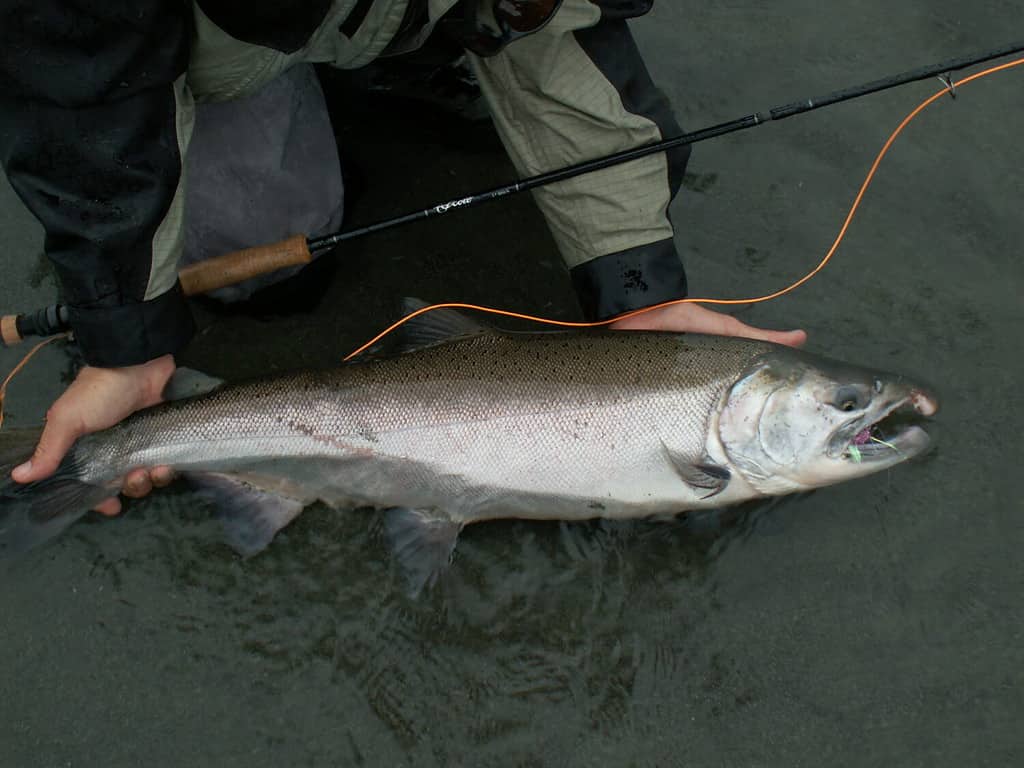Anglers love king salmon, which are also called Chinook salmon, because they are so big and willing to fight. But how much do these huge fish really weigh? It can be hard to guess and convert the weight of a king salmon based on its length and width without the right tools and methods. This in-depth article will show you how to figure out the weight of a king salmon so that you can get a better idea of how big your catch really is.
Average Weight of King Salmon
Most adult king salmon weigh between 15 and 50 pounds, but the biggest ones can weigh 100 pounds or more. However, average weights can be very different depending on the river system and region.
For example, king salmon from Alaska’s famous Kenai River weigh about 20 to 40 pounds on average. King salmon from the Columbia River between Oregon and Washington, on the other hand, usually weigh between 15 and 25 pounds. The biggest king salmon ever caught was 126 pounds and came from Alaska’s Kenai River in 1985.
Length-to-Weight Conversion Formulas
Since weighing a landed king salmon directly is not always feasible formulas exist to estimate weight based on the fish’s length and girth measurements.
One such formula is
Weight (lbs) = Length (in) x Girth (in) x Girth (in) / 800
Where length equals the total length from nose to tail in inches, and girth equals the thickest part of the body in inches.
This formula provides a rough estimate but tends to be most accurate for shorter fish under 40 inches. For larger kings the following formula is often more precise
Weight (lbs) = Girth (in)^2 x Length (in) / 800
Making sure to carefully measure total length and maximum girth will lead to the most accurate weight estimates when applying these formulas in the field.
King Salmon Length-Weight Conversion Charts
Length-weight conversion charts are another handy resource for estimating the weight of a landed king salmon based on its length. Here is an example chart:
King Salmon Length (in) – Estimated Weight (lbs)
- 25 – 6
- 30 – 11
- 35 – 17
- 40 – 25
- 45 – 35
- 50 – 48
- 55 – 64
- 60 – 82
These charts provide a quick reference for weight estimates categorized across the most common king salmon length ranges. However, it is important to note they represent above-average weights, not absolute averages. Outlier skinny or fat fish may weigh noticeably less or more.
Regional Length-Weight Standards
Generic conversion formulas and charts provide reasonable estimates, but using region-specific length-weight data often improves accuracy.
For example, the Alaska Department of Fish and Game compiles custom length-weight charts for major salmon fishing rivers like the Kenai and Copper. Biologists collect actual weight data from sampled fish to create tailored conversion charts reflecting the unique size profiles of that river system.
Checking for a regional length-weight chart can remove the need to guesswork when estimating your catch weight on specific rivers.
Additional Weight Estimating Tips
Here are some additional tips for dialing in weight estimates of a prized king salmon:
-
Measure carefully – Precision when measuring total length and girth leads to the most accurate weight calculations. Use a reliable measuring tape or marked rod.
-
Consider body shape – Stocky, thick-bodied fish weigh more than slender ones of the same length. Adjust estimates up or down accordingly.
-
Factor in maturity – Full adult spawners with pronounced kypes (hooked jaws) tend to weigh more than younger, immature fish at equal lengths.
-
Note condition – Healthy, robust fish weigh more than skinny or worn-down fish. Take fish condition into your estimate.
-
Use ice weight – Weighing your catch after icing it down provides the most certain weight, even if applying formulas after the fact.
While formulas, charts, and techniques provide estimates, actually weighing your catch is the only surefire method. But armed with the information above, anglers can now make much more educated guesses regarding the weight of a trophy king salmon they successfully land. Dialing in accurate weight estimates will lead to better record keeping and a fuller appreciation of the sheer size these iconic fish can attain.

big king salmon weight revealed !!
FAQ
What is the average size of a king salmon?
How much a pound is king salmon?
How much does a king salmon fillet weigh?
How long is a 30 pound salmon?
How big does a king salmon get?
King Salmon, also known as Chinook Salmon, is the largest species of salmon and is native to the Pacific Northwest area of North America. These magnificent fish can grow to impressive sizes, with adult males reaching lengths of up to three feet and weighing over 100 pounds. Females are generally smaller, but still substantial in size.
How big should a 50 pound king salmon be?
If we start with the biggest of the two, the king salmon, a 50 pounder would have to have an approximate length of 48 to 50 inches. An Atlantic salmon of the same weight would probably have to be even longer due to its somewhat more slender and torpedo-like body shape.
How big is a king salmon in New Zealand?
While not reaching the outrageously massive size of their North American relatives, NZ king salmon can still grow pretty big. Their average weight is between 10 and 15lb, and they can reach a maximum weight of about 40lb in the waters of New Zealand. How Big Are Salmon When They Go to The Ocean?
How big does salmon get?
Most of us have seen salmon weighing a couple of pounds, swimming around in the water, or being served on the dinner plate. But how big do salmon actually get? King salmon are the biggest of the salmon family, reaching a maximum weight of about 125lb and a length of 60 inches.
